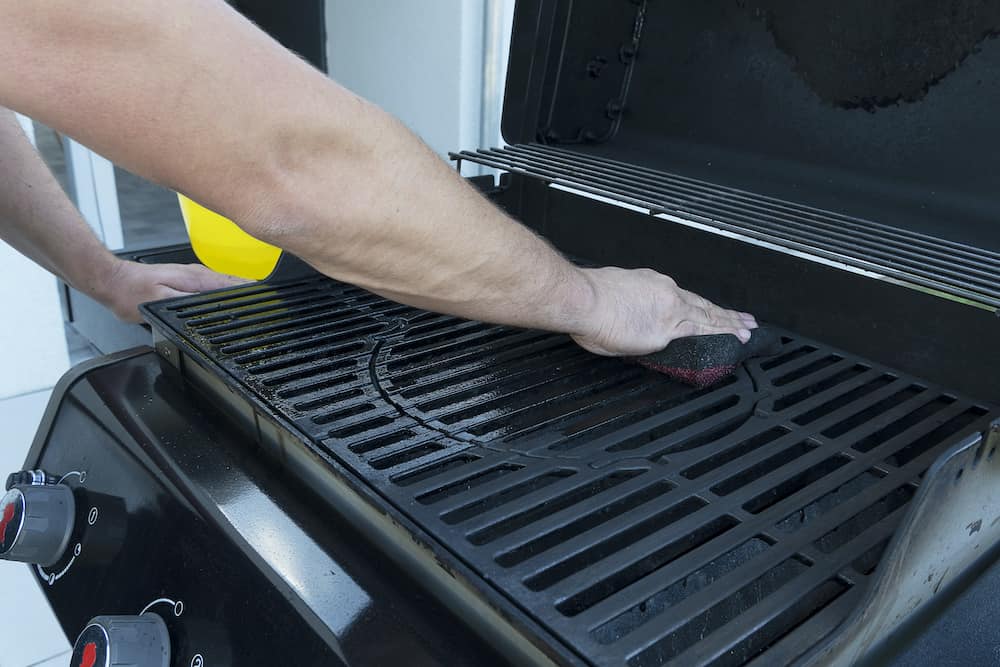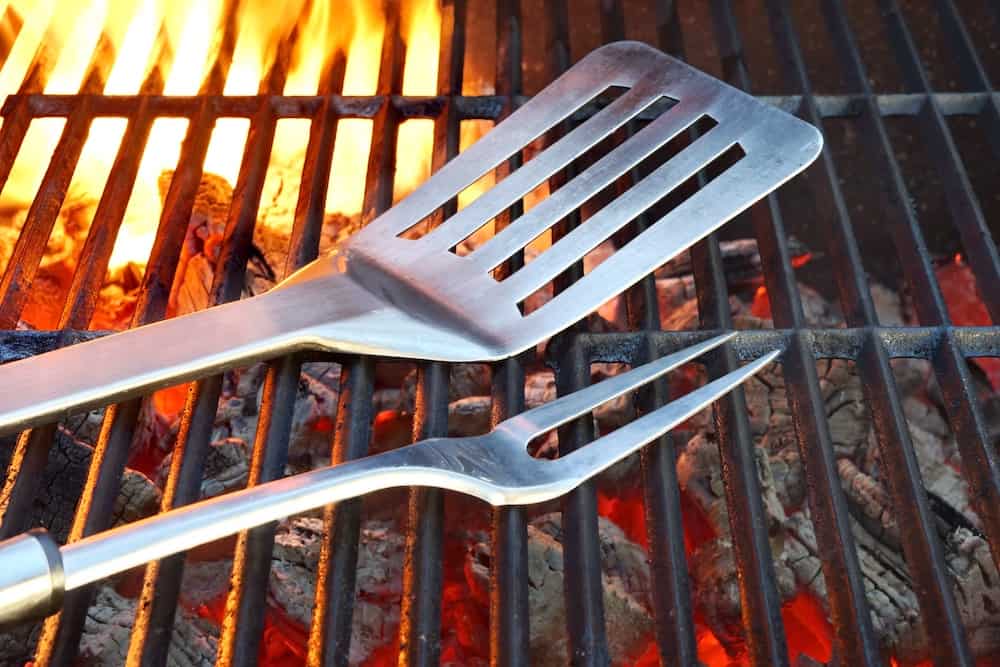While many BBQ enthusiasts like to talk about how important it is to do, not everyone knows how to season a grill.
How does this technique make grilling so much better? And if it really does make food cook better, why is it that not everyone is familiar with how to go about seasoning a grill?
Today, I’ll break down the “whys” and the “how’s” of seasoning a grill so that you can have the ultimate grilling experience.
With these tips, you’ll be able to grill with more flavor and pizzazz than you’ve ever had before.
Why Is It Important to Season a Grill
Barbecue and grilling connoisseurs often talk about how they season their grill, but why do they do it?
What makes seasoning grill grates so crucial that people spend months perfecting their techniques?
There are quite a few reasons why so much importance is placed on this process.
1. Seasoning gets rid of manufacturing remnants
While everybody loves the pristine look of new grill grates, those shiny grates may have chemical residues left from manufacturing.
If you cook directly on the grates without cleaning or seasoning them, you may ingest or taste these residues on your food.
Seasoning a new grill before you cook with it will burn off those chemicals and allow for a much healthier, tastier result.
2. It makes cooking easier
Another reason to season the grill is that it makes cooking easier.
When grill grates are correctly seasoned, foods will be less likely to stick to the grill. This is because the seasoning process makes the grates slicker.
Grill masters looking to use cast-iron grill grates, in particular, will be impressed by the difference seasoning makes for cooking ease.
3. It makes cleanup and maintenance easier
In addition to making cooking easier, taking the time to season your grill grates makes it easier to clean up once you’re done grilling.
Seasoning creates protective buildup, which will help keep the grill grates from rusting as moisture won’t be able to get into the metal and sit on it.
Additionally, cleaning off the grill will be easier because fewer food particles will stick to it.
4. It adds flavor
Many cooks find that grill grates that have been seasoned will create stronger, smokier flavors for irresistible barbecue recipes.
In fact, the longer that you use and season a grill, the better the flavor will become.
As the fats and oils build up, the flavor of that seasoning is released whenever the grill heats up.
Having this type of seasoning buildup thus creates a pronounced flavor. That is, after all, why it is called “seasoning” the grill!
Without this process, the things that come off the grill might be a little bit lackluster.

- Season a grill before using it for the first time.
How to Season a Grill
Now that you’ve learned why people care about seasoning, let’s talk about how to season grill grates.
Step 1: Clean the Grill
Use plain water to clean off the grill grates when you first bring it home. This will allow you to get rid of any dust, metal shavings, or other contaminants left from shipping.
If you’re seasoning an existing grill, use warm, sudsy water to remove any buildup. A brush or piece of crumpled aluminum foil can also be used to scrub off any tough bits.
You can also close the lid and allow the grill to heat up to burn off other residues. Then, use a brush to remove the remaining ash.
Allow the grill to dry.
Step 2: Coat the Grates With Oil
Now, you will start the seasoning. At the base level, all you need to do to season the grill is to coat the grates with oil.
Using a paper towel or a soft brush, apply oil to the grates and the inside of the lid.
You can be rather liberal with the amount of oil used, but try not to let it drop around too much. The goal is to create a thin, even layer of oil on the grates.
Step 3: Let It Cook
After applying oil to the grates, you want to turn the heat up to high, close the lid, and let it cook.
Any smoke will mix with the oil to create a strong flavor which is a big favorite among BBQ masters.
Let the oil cook onto the grates for up to 40 minutes. As time progresses, you will notice that the grill grates are getting darker and darker; this is correct.
Step 4: Cool It Down
Once the grill grates have darkened, it’s time to turn off the grill. As soon as it has cooled down completely, your grill is seasoned and ready.
The next time that you want to cook out, you can simply start grilling.
Seasoning a Grill
1. How often should grill grates be seasoned?
Everyone has their own rules about seasoning grill grates and how often it should be done. At a minimum, make sure to clean and re-season your grill every time that you see any rust forming.
If foods or marinades begin to stick to the grates, check if it’s time to re-season.
Additionally, you can avoid getting to this point by paying attention to the seasoning coating. If it begins to chip off or the color is paling, it’s time to season the grill.
Most people will season at least once a year; others season quarterly or monthly. It depends on how often you use the grill as well as your preference.
It is not possible to over season, so feel free to experiment with this.
2. Do grill grates need to be cleaned off every time your grill?
You should always scrape off any food particles that get stuck to the grill grates after grilling. However, you do not need to clean the grill deeply every time.
The point of seasoning the grill is to create flavor and prevent food from sticking.
A well-seasoned grill will not need a deep cleaning after each use, but removing any debris is always important.
3. What is the best oil to season a grill with?
When seasoning grill grates, the best type of oil that you can use is an oil with a very high smoking point.
Oils with a high smoking point are not going to burn quickly, which is important so that the food you cook doesn’t taste burnt.
You are trying to create a tasty, smoky seasoning, after all, and not a burnt flavor inducer.
New grill masters who are learning how to season grill grates might assume that they have to buy a specialty oil, but that’s not necessarily true.
There are many commonly found oils with high smoking points that are used to season a grill, including:
- Refined olive
- Canola oil
- Grapeseed oil
- Lard
- Peanut oil
- Bacon grease
- Vegetable oil from soybeans
- Sesame oil
- High-temperature avocado oil
- Almond oil
- Sunflower oil
- Corn oil
- Safflower oil
Other Things You Can Season a Grill With
Some people like to use lard or other animal fats to season their grills. This is great for flavor, but animal-fat seasoning cannot be left on the grill for as long in between uses.
The seasoning coating can actually go bad, and that would cause food to taste rancid.
It is best to use this type of seasoning only if you grill frequently or if you want to create a specific flavor one time.

- Learn how to season a grill to enhance the flavors of your foods.
4. Are stainless steel grates better than cast iron?
Stainless steel and cast-iron grates both have their benefits and drawbacks.
Stainless steel grates are an excellent choice for added protection against corrosion or rust.
Additionally, they’re generally easier to clean than cast-iron grates because of their smooth finish and lightweight construction.
You can easily move a stainless steel grate to your kitchen indoors to clean it as needed.
Cast-iron grates, on the other hand, are great for their heat retention, flavor, and durability.
This material has a much higher heat retention value than stainless steel, so it tends to create a more even and quicker cook.
Additionally, cast iron will last for many years or even decades before new grill grates are needed.
While many believe that only cast-iron grates need seasoning, both types of grates can benefit from seasoning.
With cast-iron grates, however, seasoning is more of a requirement than with stainless steel.
Barbeque grill grates aren’t all the same
Replacing Grill Grates
At some point, you might need to get new grill grates.
Whether you were not maintaining the grill grates properly or simply want to try out a different type, replacing grill grates can be easy.
Grill grates can are available in many different materials and sizes, so it is easy to find one that will fit your grill.
If you have a particular material that you want to try but can’t find it in the right size, it’s possible to buy big and then size it down.
Replacing grill grates is likely to be necessary at least once during your grill’s lifespan. You’d know that it’s time to replace it if it is broken, rusted through, or otherwise unusable.
Additionally, it might be time to replace the grill grate if you can no longer effectively season it due to chipping or flaking.
How to Season a Smoker in 3 Easy Steps
Best Gas Grill Under 500
What size grill do I need?
How Do You Season Grill Grates
Taking the time to learn how to season a grill is going to make a big difference in how your food tastes.
The intentional buildup of oil causes less sticking, more flavor, and an overall better grilling experience.
Many people are afraid to try seasoning because they don’t realize how easy it is.
Whether you are making ribs or burgers, however, seasoning your grill grates beforehand will surely make a huge difference.
Now that you have learned just how simple the process is, it’s time to change the way you grill forever!

How to Season a Grill
Many BBQ enthusiasts like to talk about how important it is to do, not everyone knows how to season a grill. With these tips, you’ll be able to grill with more
flavor and pizzazz than you’ve ever had before.
Barbecue and grilling connoisseurs often talk about how they season their grill, but why do they do it?
What makes seasoning grill grates so crucial that people spend months perfecting their techniques?
There are quite a few reasons why so much importance is placed on this process.
- Seasoning gets rid of manufacturing remnants
- It makes cooking easier
- It makes cleanup and maintenance easier
- It adds flavor
Materials
- Paper Towels
- Rag
Tools
- Grill Brush
Instructions
How to Season a Grill
Now that you’ve learned why people care about seasoning, let’s talk about how to season grill grates.
Step 1: Clean the Grill
Step 2: Coat the Grates with Oil
Best oil to season a grill with
- Refined olive
- Canola oil
- Grapeseed oil
- High-temperature palm oil
- Lard
- Peanut oil
- Bacon grease
- Vegetable oil from soybeans
- Sesame oil
- Avocado oil
- Almond oil
- Sunflower oil
- Corn oil
- Safflower oil
Step 3: Let It Cook
Step 4: Cool It Down
Notes
FAQ's about seasoning a BBQ grill
1. How often should grill grates be seasoned? Any time you see rust
2. Do grill grates need to be cleaned off every time your grill? Yes
3. Are stainless steel grates better than cast iron
How Do You Season Grill Grates
Taking the time to learn how to season a grill is going to make a big difference in how your food tastes. The intentional buildup of oil causes less sticking, more flavor, and an overall better grilling experience.

